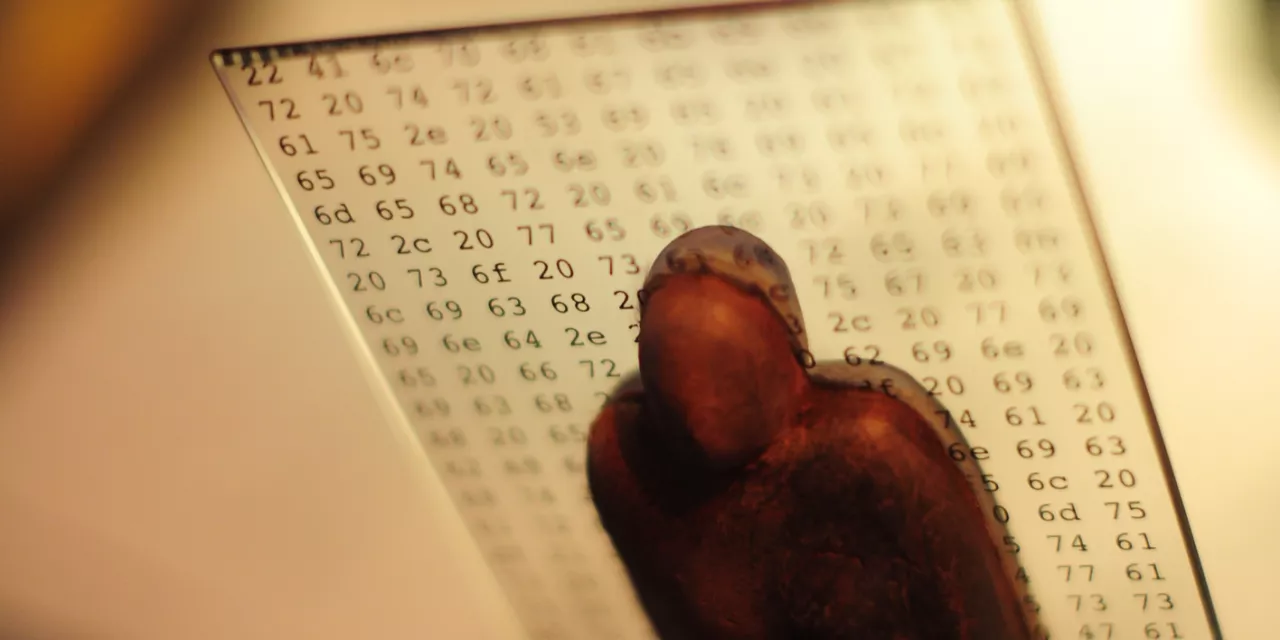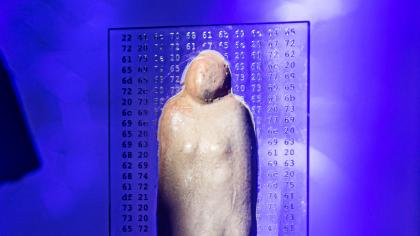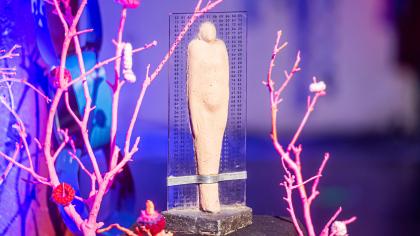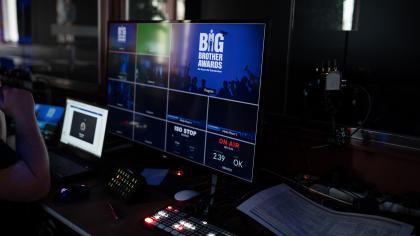A Sculpture that invites to a Conversation
It is a clay figurine on a pedestal. It has no face and shows only a few physical features overall: arms, legs, chest. It hunches its shoulders. A stream of numbers, etched onto a screen, flows and cuts through it. A lead band ties the figure to the screen and to the stream. A long gash is on its back. The figure has no spine.
Since the year 2000, data leeches receive our negative awards for violations of people’ s privacy – the BigBrotherAwards. For a while we have neglected giving the sculpture that we present as a trophy an in-depth introduction. It’s time to change that.
Because this sculpture is more than just a trophy. It is a work of art and an invitaton to a conversation.
Orwell’s novel “1984” is the origin of the BigBrotherAwards
“If you want a picture of the future, imagine a boot stamping on a human face—for ever.” (George Orwell: 1984)
The BigBrotherAwards are an international project. In 19 countries so far, these awards have highlighted schemings that threaten people, and they have dragged data leeches into the spotlight. The name of the awards is taken from George Orwell’s novel, 1984. As early as in the late 1940s, Orwell expected a society under total surveillance by the Big Brother. His vision of the future – a boot stamping on a human face – became the model for the first sculpture that was presented in the UK.
The German awards decided to diverge from the original
For the German BigBrotherAwards, artist Peter Sommer designed a new sculpture. Orwell’s vision of brutal suppression in a totalitarian state was replaced by a figurine that, through art, symbolises an invitation to a conversation: The suppressed figure is able to free itself from its shackles. The Orwell-inspired sculpture by the British inventors of the BigBrotherAwards seems like an ultimate dystopia; a dialogue, however, can lead to consequences and initiate a joint search for solutions. And the German sculpture has a literary inspiration, too.
The artist
Peter Sommer is an artist from Eastern Westphalia, the region surrounding Bielefeld. He was born in 1935 in Neustadt, Silesia. Today he lives in Oerlinghausen. Until 2000, he was a lecturer at Bielefeld University in the Arts department. The university bestowed him with the title of an honorary professor. All the sculptures that he produced for the BBA are unique with individual differences.
The data stream on the screen to which the figure is tied is a hexadecimal code. When deciphered, it yields an extract from Aldous Huxley’s novel “Brave New World”: the description of sleep-teaching. The “Brave New World“ that Huxley describes is a society of wealth consequently realised, but at a high price: For a world where everyone lives in luxury, arts and liberties are sacrificed. The individual has lost its individuality. All humans form a fully formed society.
“Alpha children wear grey. They work much harder than we do, because they’re so frightfully clever. I’m really awfuly glad I’m a Beta, because I don’t work so hard. And then we are much better than the Gammas and Deltas. Gammas are stupid. They all wear green, and Delta children wear khaki. Oh no, I don’t want to play with Delta children. And Epsi- lons are still worse.” (Insinuations during sleep-teaching – Aldous Huxley: Brave New World)
The core requirement for this formation is a standardised human. Standardised people can be calculated and manipulated, which is why they are literally grown in a glass tube and also formed psychologically. With sleep-teaching, these humans are intubated with manipulative opinions. They are forced labourers who do not need to be forced to work, as they are made to love their slavery and their particular role within it. Huxley himself was convinced that his vision would some time become reality. It is our impression that, sadly, time is proving him right and that today we are much closer to this vision than to the dystopia of 1984.
Brave New World: A novel of the Future Present
“Huxley’s ‘Brave New World’ is no longer a scenario. It is the present.” (padeluun)
In unshackled capitalism, consumption is supposed to give people satisfaction and placate them. Through direct control and manipulation, the people in Huxley’s novel are steered subconsciously. This thought from “Brave New World” matches our present better than the brutal suppression in Orwell’s “1984”. We are not only monitored by a state of totalitarian control, but also by capitalist corporations. If they pile up data about us and create personality profiles, the threat they pose to use becomes similar to that of totalitarian governments. Also, people take part in corporations’ marketing games more willingly because they expect personal benefits.
In the 1980s, Orwell’s novel “1984” was very present in people’s minds. The state was recognised as a threat to personal freedoms, but corporations were not. When commercial advertising became more loud and colourful in the 1990s, there was little awareness for privacy. That is one reason why the Payback Card (a German customer loyalty scheme supported by several retail companies) received one of our coveted awards in 2000: We wanted to make people aware that without knowing, they were being tied to the data streams already.
“The illusion that collecting bonus points while shopping is just fun and there is a free frying pan to win at the end was something we wanted to break.” (Rena Tangens)
Accepting the award – realising an opportunity
Payback did not collect their award at the gala. This seems understandable at first: Winning a BigBrotherAward is a dubious honour. But we want every winner who does appear to accept the award to be able to take a tangible prize with them. Also, we want them to have the opportunity to enter into a conversation with privacy-minded people and consider their arguments. That way, the gala can turn into a dialogue where representatives of the data leeches realise how strongly they interfer with people’s basic rights – and, by extension, their own.
By 2015, the award has been accepted three times: by Deutsche Telekom, Microsoft and the Census Commission. Sometimes a sculpture was handed over after the event or given to a winner in the form of a framed image. A memorable attempt at handing over an award was the case of Interior Minister Thomas de Maizière. In 2015, together with his predecessor Hans-Peter Friedrich, he received the Politics award for sabotaging the plans for the European Data Protection Regulation. Since de Maizière did not accept the award in person, Rena Tangens and padeluun took it with them when they appeared at the 2015 German Evangelical Church Assembly in Stuttgart. Rena Tangens used her speech to lay out the reasons for the award once again. When padeluun met the Interior Minister next to a stage, he had the sculpture in his hand and kindly asked the minister whether he would not take it with him after all, but he loudly declined: “No way!”
The figure can free itself
A one-time-only variation of the sculpture was presented in 2015. Thilo Weichert received it as a gift of thanks for his services to data protection and for his time as member of the BBA jury.
The sculpture that is given to data leeches shows a spineless person within the realm of data, divided by the data stream, unable to move or to develop. It shows the state from which we must free ourselves. The sculpture given to Thilo Weichert, however, is free and unbound, showing the state we want to reach – and which we can reach if we open up for a dialogue in order to shape the digital age in accordance with our values and basic rights.
“Also, I think the sculpture is simply gorgeous.” (padeluun)
German original: Maximilian Köster







